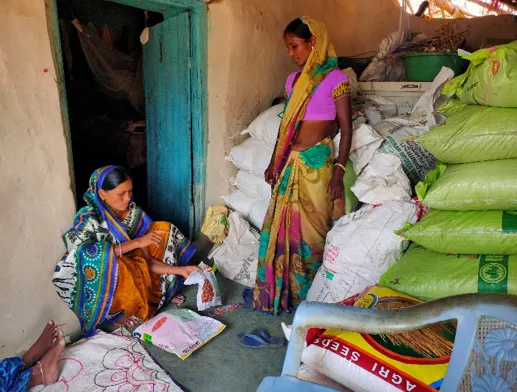Meet Sukhiya Bai who is helping 150-200 women farmers in Madhya Pradesh by modernising agriculture
Sukhiya Bai is a farmer from Madhya Pradesh who is working to help other women farmers with the best farming practices.
When Sukhiya Tumran was 12 years old, she started travelling to Itarsi, a small village in Madhya Pradesh, for work. Hailing from Juwadi village in Ghodadongri block of Betul district in Madhya Pradesh, Sukhiya grew up in a tough environment as her alcoholic father simply didn’t let her study. It was then that she realised she had to start working.
“During Dussehra each year, people would fire up brick kilns in our village and I used to work there as a maid. I also got married early and the situation at my in-law’s place was also not good. Belonging to the Scheduled Tribe community (Gond Adivashi), work has always been important for us,” Sukhiya Bai tells HerStory.
It was then that she joined the SHG (self-help group) programme promoted by PRADAN and started learning a few things. Sukhiya started with some agricultural work and was chosen to work as “Ajeevika mitra”.
“I learned a lot of things and taught my fellow farmers how to apply a basal dose, DAP, potassium, zinc and sulphur, and how to sow seeds etc. We used to discuss the requirements of the farmers like seeds, fertilisers and pesticides. After exploring the market, we use to find the best vendor, buy from them, and deliver it as demanded by farmers,” says Sukhiya.

Working with farmers
For the past two years, she has been connecting farmers to the market and selling their produce. In her village, Sukhiya organises training and meeting to educate women around best practices and management of agriculture along with providing key services and extending handholding support to them by visiting their fields regularly.
“Gradually, I increased my reach and at present, I help farmers in ten to twelve villages. I provide them with seeds and fertilisers on time so that they can start sowing at the correct time. Earlier, we used to only farm for our food requirements, but now we also farm to sell. Initially five to six women farmers did not have irrigation equipment, but after selling the vegetables, they earned enough to buy the equipment and send their children to school for education,” says Sukhiya.
Sukhiya has been engaged in educating her fellow women farmers about the best practices like basal dose, line sowing with proper spacing while planting maize to enhance productivity and income. She found the practice of line sowing and maintaining proper spacing between seeds very labour intensive for her and her other farmers in her own village and nearby villages. Labour intensity in ensuring this key practice also affected the investment over the crop.
She had to pay Rs 1,200 as labour charges to sow maize over three days, besides putting in her own efforts.
While following good practices do give a return in the end, the farmers had to deal with the high demand for human labour at the peak of the season. The rain patterns also affect the sowing. Sukhiya adds “The window that the rainy season gives us to sow seeds is very narrow. But if it rains every few days, we can’t sow seeds at all.”
This year, with the support from Corteva Agriscience, a global pure-play agricultural company, to build confidence among the farmers, Sukhiya started it with her own farm. As it was a new attachment for both farmers and tractor owners, it took time to learn the operations and mechanism of the machine to use it effectively.
Recalling her experiences, Sukhiya says, “We were able to sow seeds efficiently and in little time. We can increase or decrease the gap between the seeds depending on the tractor’s speed. Gradually, everyone will learn about this.”
Helping farmers grow
As it was a new intervention and relatively new attachment or machine for both farmer and tractor owner, Sukhiya says it will take a season or two to gain confidence and to know about dynamics of the machines like speed, movements, and its gear delivering seeds.
“At present, I am working with 150-200 farmers – providing them with seeds and fertilisers and helping them sell their produce. In the coming days, I plan to connect with 1,000-1,500 farmers and create an FPO (farmer producer organisation) through which we can provide farmers with seeds and fertilisers on time and help them sell their produce in the markets,” says Sukhiya.
She organises training to educate women around the best practices and management of agriculture, along with providing key services and extending handholding support to them by visiting their fields regularly.
She says she wants to help women farmers who don’t have the means to irrigate their farms and then educate them about best agricultural practices.
Edited by Kanishk Singh









